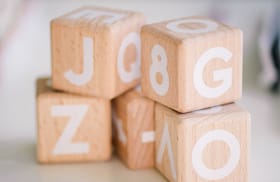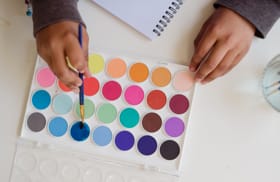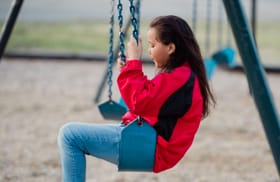



Approach
Our approach to educating young minds is developed from a multitude of resources. This frame work is based on our knowledge on early childhood theories, child development and our vast experience in dealing with children in different learning environments.
Sigmund Freud firmly believed that it was the early childhood experiences that played the greatest role in personality development. Although some scholars contradict his school of thought and argue that an individual’s personality continues to change and grow over his/her lifetime, we cannot completely ignore the influence of child hood experiences on a person’s development.
Erik Erikson’s theory of psycho social development lists of 8 stages of development which proceed well into adulthood. According to his theory the successful completion of each stage results in development of a healthy personality and acquisition of basic virtues.
The stages that RELF deals with are between (0-5 years old). So RELF emphasizes the importance of providing the children with care that’s reliable, consistent and predictable. We also believe in providing an encouraging environment, tolerant to failure which helps the children to explore the limits of their abilities.
RELF also helps children develop a sense of initiative through its guided play activities and encouraging children to ask questions. RELF reaches out to each individual child’s unique combination of intelligences through which he/she is able to learn. (Theory of Multiple Intelligenes by Dr.Howard Gardner). RELF is focused on Piaget’s first two stages of cognitive development, the sensorimotor stage and the pre-occupational stage namely where learning happens through sensory stimuli and the language is the primary area of development.
Bandura’s theory on child development suggests the children are constantly learning through observation. So RELF provides for learning through observation from live models, listening to verbal instructions, observing fictional characters display behavior patterns through films or books where children are always guided towards learning positive behavior patterns.
Vygotsky suggested that children learn actively through hands- on experience and social interactions and culture plays a major role in the development of higher order functions in children. So RELF provides the right kind of culture and gives the opportunity for children to interact with care providers, educators and peers.
Curriculum
RELF firmly advocates the concept of sensory learning. It covers training for practical life, sensory education and language activities. We also believe in having a consistent routine to encourage the purpose of predictability. This helps children to understand what happens next and encourages them to have more control in class room.
RELF also advocates the “strategize, execute, assess” model where children are encouraged to plan how they will complete the tasks ahead, actually execute the tasks and share with the classroom- community what they did and review their work. Children are strongly encouraged to return materials to their appropriate places which are represented by color coded labels.
Personal, Social, Emotional and Cognitive Development
This involves helping the children to develop a positive self -esteem and self-image about themselves. Form positive and respectful inter personal relationships with others. Develop social skills and manage one’s feelings and emotions. Develop self-confidence and learn appropriate behavior while interacting in groups.
Learning Goals:
Self-confidence and self-awareness, learning appropriate behavior patterns, managing emotions and feelings, forming social bonds and working in groups, cognitive development.
Literacy
This involves helping children to read and write. Children are encouraged to try reading by observing others reading using phonetic sounds. An interest is generated among children to write by showing them that it’s an exciting new task. Books, writing materials, poems and other reading content will be provided to them which will spark their curiosity and interest.
Learning Goals:
Reading and Writing words and simple sentences.
Creativity and Expressive Art
This involves helping children express themselves through various activities relating to art, music, movement, dance, role play, technology and design.
Learning Goals:
Children sing songs and dance. Children learn to use various craft materials, art techniques and experiment with colour, texture form and design. They begin to express themselves creatively , share their thoughts feelings and ideas through use of media, materials, songs, art , music, role play and dance.
Cultural Awareness and Understanding the world
This involves guiding children in understand the physical world around them better, helping children understand various communities in the society and cultures around them, develop a spiritual perspective, promote empathy,respect, kindness and tolerance for people, animals and environment, provide them information about various places, environment and technology.
Learning Goals:
Help children understand the similarities and differences among themselves and the others and among their families, traditions, cultures and communities and help them identify differences and similarities among places, objects, environments.
Physical Development and Wellness Awareness
This involves providing safe areas for children to be active to develop their movement, co-ordination and control. Children are made aware of physical wellness. Healthy eating choices are encouraged. Concepts of hygiene and cleanliness are taught.
Learning Goals:
Movement, co-ordination and handling. Self -care and physical wellness.
Communication and Language
This involves helping children to speak and listen in various day to day situations and build their confidence and abilities to express themselves.
Learning Goals:
Listening, paying attention, understanding verbal cues, expressing themselves by speaking.
Numeracy
This involves children to develop counting skills, learn about concepts like shapes, measures, time, spaces, sizes, simple addition and subtraction.
Learning Goals:
Learning to count 1-100, number concepts like missing numbers, greater than, less than, doubles, halves, weight, position, distance, money, number names.
Environment
Rivendale schools have safe, hygienic, clutter-free and aesthetically pleasing environments. The environment is mostly home like where children learn to develop their practical life and self-help skills such as feeding one-self or washing hands. Each child has is provided a place to keep his/her belongings.
The aesthetically pleasing environment usually consists of materials rich in learning which have labels to promote organizational skills among children. The classroom has well-defined areas for different areas which promote social – interactions and exploration.
The environment is mainly characterized by the use of wooden toys and naturally occurring material. Since our programmes are “all-weather” we encourage children to some time outdoors
happy kids
After School programs
International Experts
Years Established
Get In Touch
Location: MVP Sector 10 , Plot 10 HIG , Visakhapatnam , AP , India 530017
Telephone: +918179454062
Email: enquiry@rivendaleschools.com
School Hours: M-F: 9am – 12:30 pm
Non-Discrimination Policy
We have a strict non-discrimination policy. We do not discriminate children hailing from any religion/communal/financial background.
